It's identity politics, stupid!
 Dinesh Sharma
Dinesh Sharma
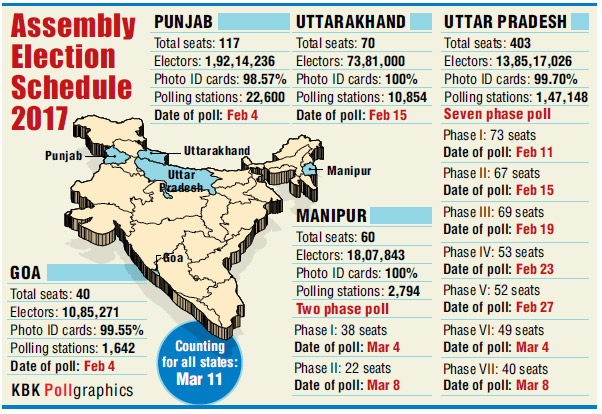 The winter in north India
is notorious for its fog.
Trains run late, air travel
goes haywire and more
often than not even road
transport crawls at a
snail's pace. But foggier is the
region's electoral scene, with three
of the five States scheduled to hold
Assembly elections—Uttar Pradesh,
Uttarakhand and Punjab. The
remaining two – Goa and Manipur--
will only be blips on TV screens
when the results are declared on
March 11, just two days before
boisterous Holi is celebrated in this
part of the country.
The winter in north India
is notorious for its fog.
Trains run late, air travel
goes haywire and more
often than not even road
transport crawls at a
snail's pace. But foggier is the
region's electoral scene, with three
of the five States scheduled to hold
Assembly elections—Uttar Pradesh,
Uttarakhand and Punjab. The
remaining two – Goa and Manipur--
will only be blips on TV screens
when the results are declared on
March 11, just two days before
boisterous Holi is celebrated in this
part of the country.
As the nation gets hooked on the multi-phase Assembly elections, the
pollsters, pundits and psephologists
are flummoxed by the political
manoeuvres, backroom deals and
changed loyalties triggered by the
denial of tickets in an environment
of high drama, ambition, intrigue
and electoral passion.
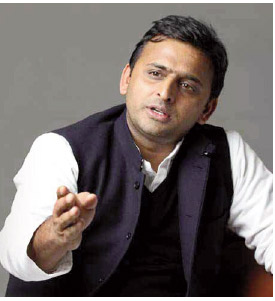 Akhilesh Yadav
Of the five State elections, the
one in Uttar Pradesh is going to make or mar the political future of the two forces arrayed against one
another. If one camp is the
Bharatiya Janata Party (BJP), the
other comprises the opposition
groups trying to stop the Modi
juggernaut individually or through
alliances.
Akhilesh Yadav
Of the five State elections, the
one in Uttar Pradesh is going to make or mar the political future of the two forces arrayed against one
another. If one camp is the
Bharatiya Janata Party (BJP), the
other comprises the opposition
groups trying to stop the Modi
juggernaut individually or through
alliances.
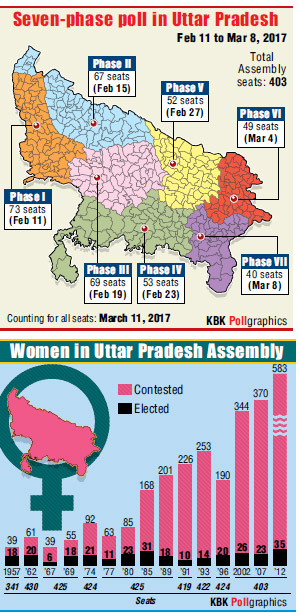 In Uttar Pradesh the siege within
the Samajwadi Party oscillated
between farce and tragedy. To borrow a phrase from Eliot, the feud
in the Yadav family has ended not
with a bang but a whimper. From
day one Akhilesh Yadav raised the
banner of revolt against his father
Mulayam Singh, patriarch and SP
supremo, while political circles have
been abuzz with conspiracy theories
about the motive behind the
rebellion.
In Uttar Pradesh the siege within
the Samajwadi Party oscillated
between farce and tragedy. To borrow a phrase from Eliot, the feud
in the Yadav family has ended not
with a bang but a whimper. From
day one Akhilesh Yadav raised the
banner of revolt against his father
Mulayam Singh, patriarch and SP
supremo, while political circles have
been abuzz with conspiracy theories
about the motive behind the
rebellion.
Some think that the youthful
Chief Minister was fed up with the
interference of some of his close
relatives led by his uncle Shivpal
Yadav, a powerful minister, whom
he had thrown out of the
Government. No one could accuse
Shivpal of integrity. Not long ago he
was caught on-camera telling a
meeting of engineers to avoid
committing robbery in favour of
small thefts .
Besides, his musclemen
Mukhatar Ansari and Atique Ahmed
whom he tried to bring into the
party were certainly not acceptable to Akhilesh Yadav.
Was it a genuine fight
between good and evil as
supporters of Akhilesh
claimed, or everything
done as per script?
According to some
veteran political
commentators in
Lucknow and Delhi, Steve
Jardin, a Harvard
University Professor and
political strategist hired
by Akhilesh had advised
him to distance himself
from family and
traditional party
supporters who had
given the party a bad
name. Mulayam Singh,
too, was believed to have
played his part as per
script.
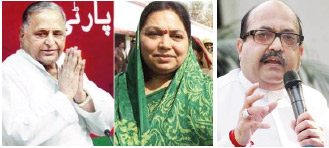 Mulayam Singh Yadav, Sadhana
Gupta and Amar Singh
Another theory was that Sadhana
Gupta and Amar Singh, known for
his deal-making, had prevailed upon Mulayam Singh Yadav to cut
Akhilesh to size as he was growing
too big for his boots. No wonder, the
long political drama playing out in
Lucknow for the Election Commission in New Delhi kept the
entire State or, for that matter, the
country at large in a state of
suspense.
Mulayam Singh Yadav, Sadhana
Gupta and Amar Singh
Another theory was that Sadhana
Gupta and Amar Singh, known for
his deal-making, had prevailed upon Mulayam Singh Yadav to cut
Akhilesh to size as he was growing
too big for his boots. No wonder, the
long political drama playing out in
Lucknow for the Election Commission in New Delhi kept the
entire State or, for that matter, the
country at large in a state of
suspense.
However, with the battle for the
party symbol of bicycle won by Akhilesh Yadav, the curtain suddenly
came down on the family drama. All
the characters either exited the
stage or threw in the sponge.
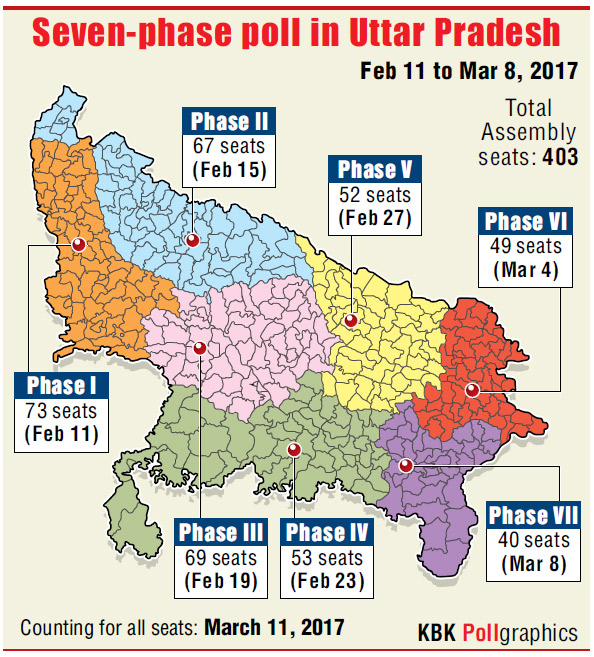 Was it a genuine fight between
good and evil as supporters of
Akhilesh claimed, or everything
done as per script? According to
some veteran political
commentators in Lucknow and
Delhi, Steve Jardin, a Harvard
University Professor and political
strategist hired by Akhilesh had
advised him to distance himself
from family and traditional party
supporters who had given the party
a bad name. Mulayam Singh, too,
was believed to have played his part
as per script.
Was it a genuine fight between
good and evil as supporters of
Akhilesh claimed, or everything
done as per script? According to
some veteran political
commentators in Lucknow and
Delhi, Steve Jardin, a Harvard
University Professor and political
strategist hired by Akhilesh had
advised him to distance himself
from family and traditional party
supporters who had given the party
a bad name. Mulayam Singh, too,
was believed to have played his part
as per script.
Has this drama or a genuine
battle helped Akhilesh emerge as a
hero fighting for clean politics?
Well, his supporters think so. But
the jury is still out. The doubters
have one inescapable fact on their side: Akhilesh is not confident of
facing up to the Modi wave alone.
That's why he has sewed a last
minute alliance with the Congress
by ceding as many as 105 seats to
the latter. sew a last minute alliance
with the Congress. The S.P. will
contest 298 seats out of the 403-
strong House.
However, the S.P. has ditched Ajit
Singh, son of Prime Minister Charan
Singh and legendary farmers' leader
who had unchallenged sway among
the Jats of western Uttar Pradesh.
There are two reasons Akhilesh has
decided not to enter into any
alliance with Ajit Singh. Firstly, he is
perceived as the most unreliable
quantity in the Indian politics.
Secondly, any truck with Ajit Singh
might have alienated the Muslims
of the western Uttar Pradesh where the embers of the riots are still
smouldering.
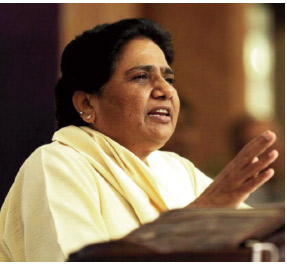 Mayawati
What has finally persuadede
Akhileshto enter into an alliance
with the Congress is his paarty's
calculation that with the two parties
coming together Muslims will rally
around them. Besides, 13 per cent
Yadavs and nearly 10 per cent
Congress party's vote share will
make the alliance a formidable force
. The electoral strategies of the S.P. and the BSP led by Dalit icon
Mayawati are anchored in caste
politics.
Mayawati
What has finally persuadede
Akhileshto enter into an alliance
with the Congress is his paarty's
calculation that with the two parties
coming together Muslims will rally
around them. Besides, 13 per cent
Yadavs and nearly 10 per cent
Congress party's vote share will
make the alliance a formidable force
. The electoral strategies of the S.P. and the BSP led by Dalit icon
Mayawati are anchored in caste
politics.
Now the supporters of both
Congress and the S.P. appear to
have been energised with the
prospects of a joint campaign by Priyanka Gandhi and Dimple Yadav,
wife of the U.P. Chief Ministeer,
who is already in politics, having
won a Lok Sabha seat for herself.
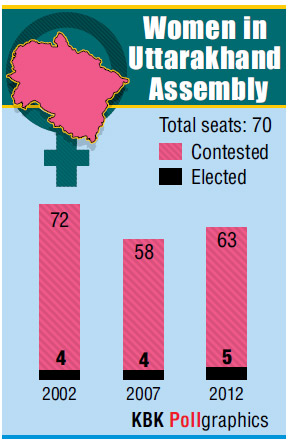 Whatever the electoral fate of the two parties, the alliance is
historic, indeed. S.P. patriach
Mulayam Singh Yadav who formed
the party 25 years ago and nursed it
single-handed had spent his entire
political career as a socialit. For a
man known as a Congress baiter,
this is first time that his party has
joined hands with the Congress. This
is what explains Mulayam Singh's
absence from the joint show where
the alliance was formally
announced. Well, as they say pigs
can fly and anything can happen in
politics.
Whatever the electoral fate of the two parties, the alliance is
historic, indeed. S.P. patriach
Mulayam Singh Yadav who formed
the party 25 years ago and nursed it
single-handed had spent his entire
political career as a socialit. For a
man known as a Congress baiter,
this is first time that his party has
joined hands with the Congress. This
is what explains Mulayam Singh's
absence from the joint show where
the alliance was formally
announced. Well, as they say pigs
can fly and anything can happen in
politics.
In any case, the State is poised for
a three-pronged electoral battle
among the S.P-Congress, BJP and
BSP. As things stand, the BSP is on a
slippery ground today as the upper
castes, non-Jatav Dalits, Muslims
and the OBCs have deserted it for a
variety of reasons. Only a year ago
the BSP was reckoned to be a front
runner in the State.
One common feature of the
elections in all the five States is the
blatant or subtle attempts to
leverage religious and caste identities. While the SP, BSP and
Congress are banking on Muslim,
Yadav and Dalit voters in U.P. and
Uttarakhand, the Congress's USP is
Thakur and Muslim combination in
Uttrakhand. In Punjab, both
Congress and the Akalis are trying to
prove the true champions of the Jat
Sikhs.
Surprisingly, the BJP which too
had its share of identity politics in
the form of Hindutva, has opted to
contest the election only on the
platform of economic development.
And the demonetisation is going to
be a key plank of its campaign. That
the party is not raking up the Ram
Mandir issue is very significant. The
BJP has sidelined firebrand
Hindutwa faces such as Yogi
Adityanath of Gorakhpur, another proof of the party's move towards a
secular brand of politics.
The elections in Punjab
and Goa are unique in
themselves. In both States,
there is a very strong antiincumbency
factor. The
BJP is a junior partner in
the Akali Government in
Punjab. It is going to sink
or swim with the Akali Dal.
The BJP suffered a big jolt
with its most familiar Sikh
face, Navjot Singh Sidhu,
switiching his loyalty to
the Congress.
As far as the social equation is
concerned, the BJP is expecting to
garner votes from the upper castes,
OBCs and major support from the
non-Jatav or Chamar sections of
Dalits. Additionally, the party hopes
to win over the swing voters by
using the Modi magic.
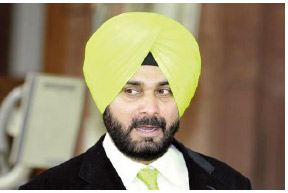 Navjot Singh Sidhu
Interestingly, the AAP which had
its baptism as a crusader for clean
politics, good governance and nonsectarian
approach has made a complete about-turn.A look at the
ubiquitous posters of Kejriwal in
Delhi and Punjab wearing a yellow 'patka', a kind of Sikh turban shows
the change he has undergone. And
juxtapose this picture of Kejriwal
embracing Lalu Yadav, has been
convicted for corruption, during the
last Bihar Assembly elections, and
one kind find how far he has
travelled in his pursuit of political
goal. Well, it was in sync with his
transformation that the Delhi Chief
Minister went all the way to the
Vatican to attend the canonization
of Mother
Navjot Singh Sidhu
Interestingly, the AAP which had
its baptism as a crusader for clean
politics, good governance and nonsectarian
approach has made a complete about-turn.A look at the
ubiquitous posters of Kejriwal in
Delhi and Punjab wearing a yellow 'patka', a kind of Sikh turban shows
the change he has undergone. And
juxtapose this picture of Kejriwal
embracing Lalu Yadav, has been
convicted for corruption, during the
last Bihar Assembly elections, and
one kind find how far he has
travelled in his pursuit of political
goal. Well, it was in sync with his
transformation that the Delhi Chief
Minister went all the way to the
Vatican to attend the canonization
of Mother
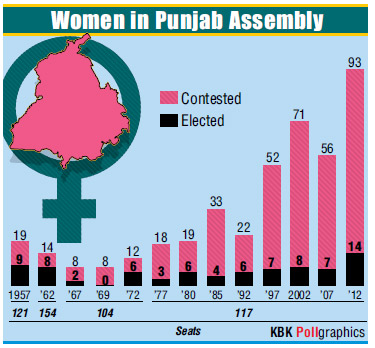 Teresa. After all he had his eyes
on the Goa Assembly elections
where there is a substantial Catholic population.
Teresa. After all he had his eyes
on the Goa Assembly elections
where there is a substantial Catholic population.
So what will be the final outcome
in Uttar Pradesh? Now the State is
poised for a triangular fight
between the SP-Congress alliance,
BJP and SP. The advantage of the SP
is that it has a youthful leader as the
candidate for Chief Minister while the BJP has
none. But if the
fight gets too
close, the State
might end up
with a hung
Assembly.
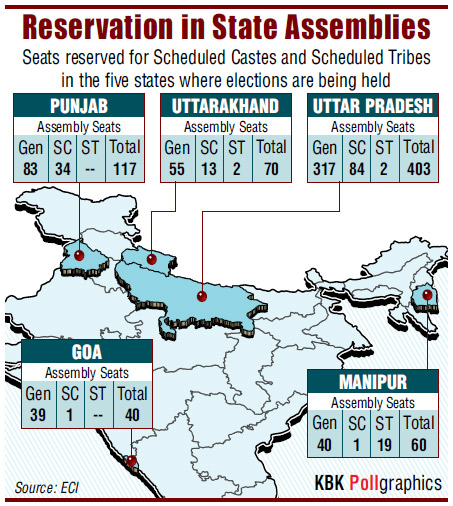 That the BJP is
going to the
hustings without
a chief
m i n i s t e r i a l
candidate cuts
both ways.
While it is a
disadvantage on
the one hand, it
also acts as a
cohesive factor
as every leader
or social groups
can keep their
aspirations alive.
That the BJP is
going to the
hustings without
a chief
m i n i s t e r i a l
candidate cuts
both ways.
While it is a
disadvantage on
the one hand, it
also acts as a
cohesive factor
as every leader
or social groups
can keep their
aspirations alive.
Neighbouring Uttarakhand is
another state witnessing turmoil of
a different kind. The outgoing Congress government headed by
Harish Rawat is mired in charges of
corruption. The party has also seen
some last minute desertions that
have weakened it further. It appears
that the BJP may wrest the State
from the Congress. However, BJP is
also facing rebellion as the party has
embraced several Congress deserters and given them ticket.
Goa too is witnessing a
replay of the Punjab
scenario. The BJP has lost
many of the advantages it
had last time when it
swept to power. Nearly 30
per cent Christian voters
deserted the Congress and
voted for the BJP. The
situation is different this
time. While the BJP is riven
by dissent and desertions,
AAP is into the game of
being a spoilsport.
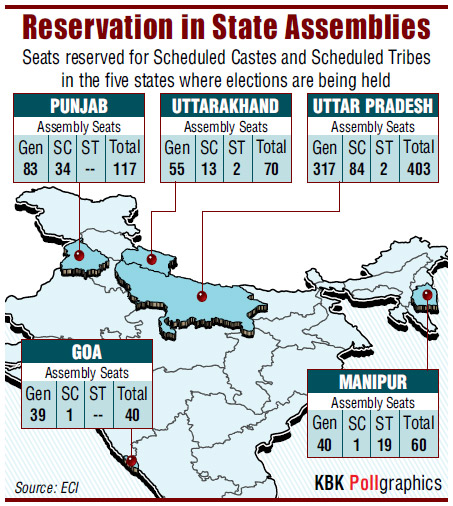 The elections in Punjab and Goa
are unique in themselves. In both
States, there is a very strong antiincumbency
factor. The BJP is a junior partner in the Akali
Government in Punjab. It is going to
sink or swim with the Akali Dal. The
BJP suffered a big jolt with its most
familiar Sikh face, Navjot Singh
Sidhu, switiching his loyalty to the
Congress. In Punjab the issues of
corruption against the Badal family
and the menace of drug trade
allegedly promoted by one of its
members are a major drag on the
Akali-BJP alliance.
The elections in Punjab and Goa
are unique in themselves. In both
States, there is a very strong antiincumbency
factor. The BJP is a junior partner in the Akali
Government in Punjab. It is going to
sink or swim with the Akali Dal. The
BJP suffered a big jolt with its most
familiar Sikh face, Navjot Singh
Sidhu, switiching his loyalty to the
Congress. In Punjab the issues of
corruption against the Badal family
and the menace of drug trade
allegedly promoted by one of its
members are a major drag on the
Akali-BJP alliance.
Both in Punjab and Goa the Aam Aadmi Party
(AAP) is lurking around like Banco's ghost. It has
fielded a good number of candidates against the Akali
Dal-BJP combine. AAP hopes to cut into the vote banks of
both the Congress and the Akali Dal-BJP combine.
If the State were to see a direct fight between the
Congress and the ruling Akali Dal, there would
be no prize for guessing about the winner. But
with AAP as the third force, it is to be seen if it
would be a spoiler for the Akali Dal-BJP combine or the
Congress. There is a risk of a hung Assembly in
Punjab as well.
Goa too is witnessing a replay of the Punjab scenario.
The BJP has lost many of the advantages it had last time when it swept to power. Nearly 30 per cent Christian
voters deserted the Congress and voted for the BJP. The
situation is different this time. While the BJP is riven by
dissent and desertions, AAP is into the game of being a And the fifth State, Manipur, where the Congress is in
power is likely to vote the present government back in.
Long blockades and agitations there can be blamed on
the Central Government, helping the Congress win the
sympathy votes.
Well, even if the winter fog will have cleared by the
time the elections are over, the political mist will go away
only on March 11 when the results in the five States are
declared.




 Dinesh Sharma
Dinesh Sharma

 Akhilesh Yadav
Akhilesh Yadav
 Mulayam Singh Yadav, Sadhana
Gupta and Amar Singh
Mulayam Singh Yadav, Sadhana
Gupta and Amar Singh
 Mayawati
Mayawati
 Navjot Singh Sidhu
Navjot Singh Sidhu

